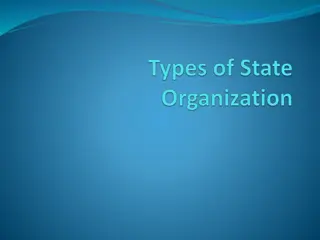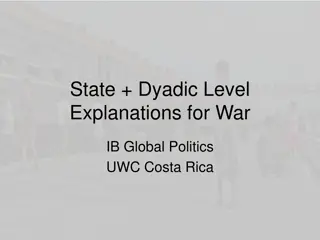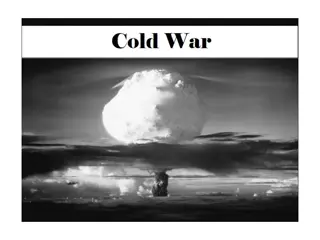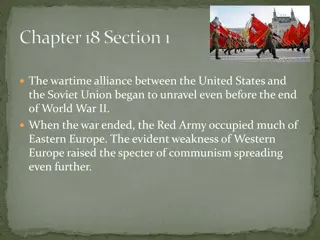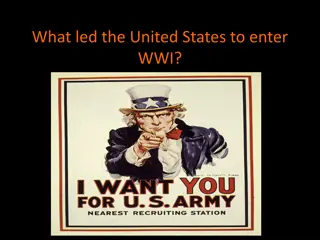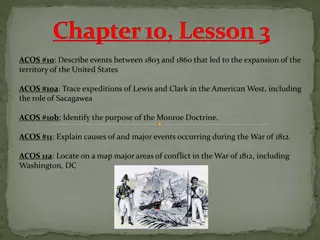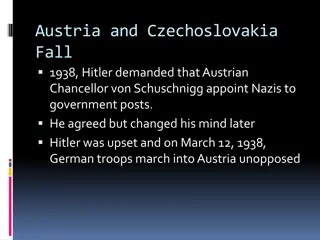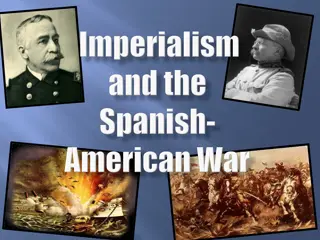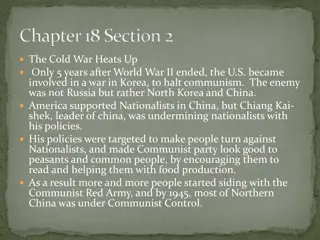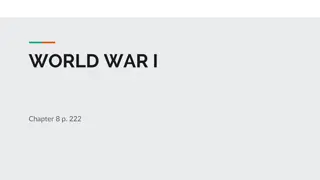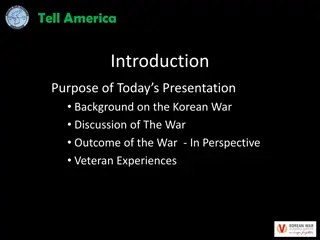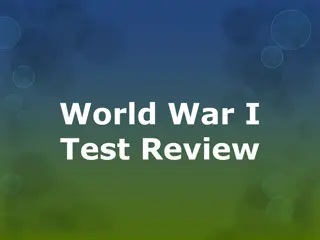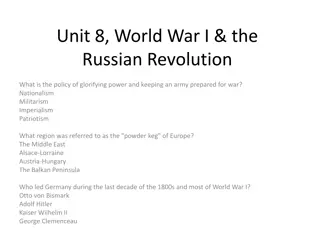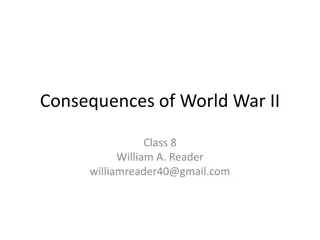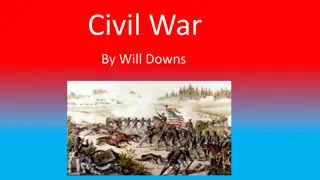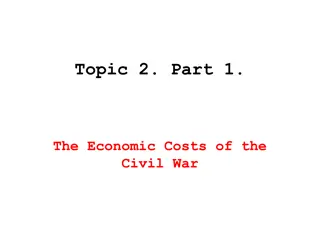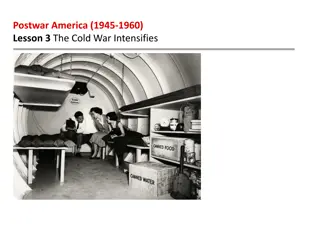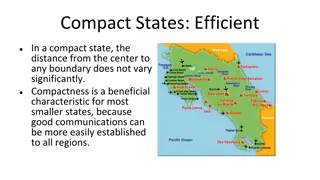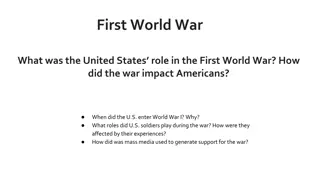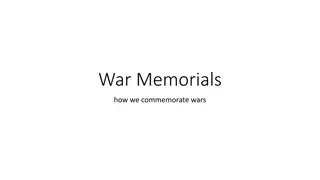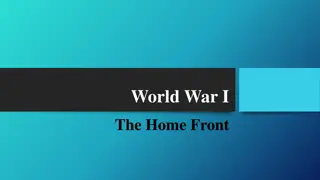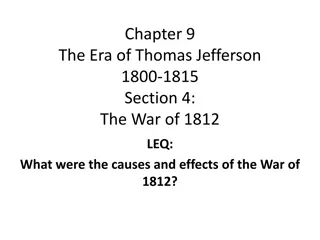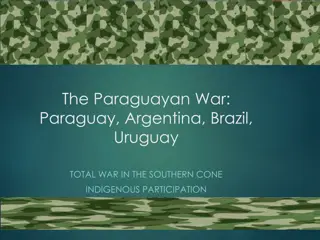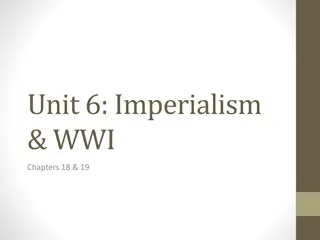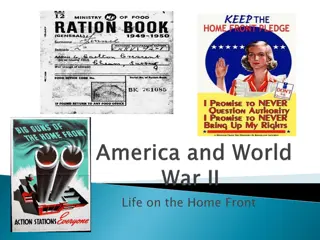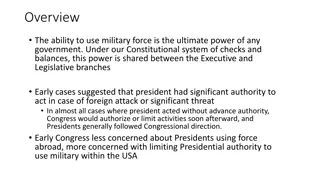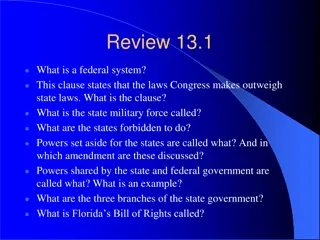❤[PDF]⚡ Civil War Talks: Further Reminiscences of George S. Bernard and His Fel
\"COPY LINK HERE ; https:\/\/getpdf.readbooks.link\/0813931754\n\nRead ebook [PDF] Civil War Talks: Further Reminiscences of George S. Bernard and His Fellow Veterans (A Nation Divided: Studies in the Civil War Era) | Civil War Talks: Further Reminiscences of George S. Bernard and His Fellow Vetera
1 views • 6 slides
Overview of Unitary, Confederal, and Federal States
Unitary, confederal, and federal states each have distinct characteristics regarding the distribution of power between central and subnational governments. Unitary states have centralized governance, while devolved states like the UK grant autonomy to subnational entities. Decentralized states trans
0 views • 22 slides
The Homefront: U.S. War Production Efforts During World War II
During World War II, the United States mobilized its industries for total war production, converting peacetime factories into facilities for producing planes, tanks, rifles, and more. The U.S. became the Allies' biggest armaments supplier, producing millions of war supplies and significantly boostin
2 views • 25 slides
Examining State-Level and Dyadic Explanations for War in Global Politics
Understanding the reasons why certain states are more war-prone than others involves exploring factors such as economy, internal opposition, and political systems. Marxist explanations argue that capitalist economies are more prone to war due to issues like overproduction, wealth inequality, and imp
0 views • 17 slides
Hyaluronic Acid for Acne-Prone Skin Benefits and Tips
Acne-prone skin requires special care and attention to maintain its health and appearance. One ingredient that has garnered significant attention in the skincare community is hyaluronic acid. Known for its exceptional hydrating properties, hyaluronic
0 views • 5 slides
The Cold War: Rivalry and Tension Between Superpowers
The Cold War, lasting from post-World War II to the 1980s, was defined by political tension and rivalry between the United States and the Soviet Union. Despite never engaging in direct military combat, both sides competed through political maneuvering and propaganda, impacting global conflicts and t
0 views • 11 slides
Salicylic Acid Face Wash The Ultimate Solution for Acne-Prone Skin
Acne is a common skin concern that affects millions of people worldwide. It can be frustrating and challenging to manage, especially for those with acne-prone skin. Among the myriad of treatments available, salicylic acid face wash stands out as one
0 views • 6 slides
Origins of the Cold War: Yalta and Potsdam Conferences 1945
The Cold War's origins stem from the tensions and suspicions between the USSR and the West post-World War II, highlighted through conferences like Yalta and Potsdam. At the Yalta Conference, held in February 1945, crucial decisions were made regarding Germany, Poland, and the UN. The Potsdam Confere
0 views • 10 slides
Sea Buckthorn Oil_ A Natural Remedy for Acne-Prone Skin
Sea Buckthorn Oil as a natural remedy for Acne- Prone Skin
0 views • 4 slides
Insights into World War Two and Adolf Hitler's Role
World War Two started on September 3, 1939, with Britain and France declaring war on Germany. Adolf Hitler's rise to power, initiation of the war, and involvement in the Holocaust are highlighted. The Star of David symbolized Jewish identity under Hitler's rule, and the Holocaust saw six million Eur
0 views • 6 slides
The Unraveling of the Wartime Alliance and the Beginnings of the Cold War
The chapter delves into the breakdown of the wartime alliance between the United States and the Soviet Union post-World War II. Tensions rose as the Red Army occupied Eastern Europe and communism seemed to spread. The Marshall Plan's role in restoring Western Europe, coupled with events like the Cze
1 views • 15 slides
Analysis of W.B. Yeats' Poetry During World War I
W.B. Yeats' poetry during World War I reflects a unique perspective on the conflict, as seen in works like "An Irish Airman Foresees His Death" and "On Being Asked for a War Poem." Delving into themes of sacrifice, duty, and the futility of war, Yeats offers a contrasting view to the graphic realism
0 views • 7 slides
Why the United States Entered World War I
The United States initially remained neutral during World War I, but various factors led to its eventual entry into the conflict. Growing anti-German sentiments, impact of the war on the American economy, incidents like the sinking of the Lusitania, and the revelation of the Zimmerman Telegram all p
0 views • 18 slides
Expansion and Conflict in 19th-century America
In the early 1800s, events such as the War of 1812, conflicts with Britain, and the efforts of figures like Tecumseh and the War Hawks shaped the expansion of the United States territory. The expeditions of Lewis and Clark, along with the role of Sacagawea, played a vital role in exploring the Ameri
0 views • 14 slides
Timeline of Key Events Leading to World War II
In the years leading up to World War II, a series of significant events unfolded in Europe. From Hitler's demands and annexations to the signing of pacts and the invasion of Poland, tensions escalated rapidly. The Munich Agreement, German offensive in Poland, declaration of war by France and Britain
0 views • 12 slides
The Impact of the Korean War on Global Relations
The Korean War, often dubbed the "Forgotten War," had significant implications on global politics and relationships. This conflict was characterized by a mix of conventional and guerilla warfare tactics. China's involvement in the war had a profound impact on its relations with the U.S. and the U.S.
0 views • 14 slides
The Spanish-American War: Origins and Impact
The Spanish-American War was fueled by a combination of factors including economic struggles, imperial ambitions, and sensationalist journalism. Theodore Roosevelt's stance on war, coupled with the desire for Cuba's independence from Spain, led to a call for war in the late 1890s. Yellow journalism
0 views • 18 slides
The Cold War Heats Up: Korea and China Conflict
The post-World War II era saw the U.S. engaging in the Korean War to combat communism, facing off against North Korea and China instead of Russia. Conflict in China between the Nationalists led by Chiang Kai-shek and the Communists under Mao Tse-tung intensified, with Chiang's authoritarian rule spa
0 views • 14 slides
Solving N-Queens and Missionaries & Cannibals Problems Using Search Algorithms
Explore the application of search algorithms in solving classic problems like the N-Queens problem and the Missionaries & Cannibals dilemma. Understand the concept of states, start states, goals, transitions, and goal states in these puzzles. Dive into the strategies of adding states to a to-visit l
0 views • 8 slides
Causes and Outbreak of World War I
Various factors such as nationalism, imperialism, militarism, and the assassination of Archduke Francis Ferdinand led to the outbreak of World War I. The tensions in Europe escalated as countries formed alliances and mobilized for war. The conflict resulted in early battles like the Battle of Marne
0 views • 23 slides
Overview of the Korean War: Background, Discussion, and Outcome
This presentation delves into the background of the Korean War, highlighting the historical context from the Korean Peninsula's division after World War II to the outbreak of the conflict in 1950. It discusses the involvement of North and South Korea, as well as key players like the United States, t
0 views • 15 slides
World War I Test Review and Historical Overview
Learn about the key terms and concepts related to World War I, including militarism, nationalism, neutrality, propaganda, espionage, and more. Explore the long-term causes of the war, the immediate trigger, the Central Powers and Allied Powers involved, as well as important events like the Zimmerman
0 views • 13 slides
World War I and the Treaty of Versailles: Key Events and Consequences
The policy of glorifying power and militarism, the tensions in the Balkan Peninsula, Germany's leadership, causes of the United States' entry into World War I, impact of unrestricted submarine warfare, transition to total war, the end of the war with an armistice, the Treaty of Versailles assigning
0 views • 10 slides
The Impact of World War II on Japan and the Emergence of the Cold War
World War II had far-reaching consequences on Japan, leading to significant naval battles, intense fighting in Okinawa, and ultimately, the country's surrender following the atomic bombings of Hiroshima and Nagasaki. The post-war period saw the emergence of the Cold War as tensions rose between the
0 views • 63 slides
The Civil War: Causes, Battles, and Impact
The Civil War started in 1861 due to the issue of slavery in the United States. It lasted from 1861 to 1865 and resulted in significant bloodshed, with key battles like Gettysburg and Antietam. Despite the North's advantages in population and resources, the Confederates put up a stubborn resistance.
0 views • 16 slides
The Economic Costs of the Civil War and Its Impact on Growth
The Civil War led to significant economic costs for both the North and the South, including direct expenses such as government spending, destruction of physical and human capital, and indirect costs due to reduced consumption. The war resulted in massive casualties and had a profound impact on the e
0 views • 34 slides
The Cold War Escalates: Postwar America 1945-1960 Lesson 3
The period after World War II saw tensions intensify between the United States and the Soviet Union, leading to a global struggle for influence. The arms race, the space race, and significant international conflicts all heightened Cold War tensions. President Eisenhower's response to communism diffe
0 views • 17 slides
Characteristics of Different State Shapes Explained
Compact states have efficient communication due to their balanced shape, while prorupted states extend for access or disruption. Elongated states face potential isolation issues, and fragmented states are problematic with territorial pieces separated. Perforated states, like South Africa, completely
0 views • 17 slides
The United States in World War I: Impact, Soldiers' Experiences, and Media Support
The United States played a significant role in World War I, entering the war in 1917 and sending soldiers to fight in Europe. The war impacted Americans socially and economically. U.S. soldiers served in various roles and were affected by their experiences. Mass media was used to generate support fo
0 views • 15 slides
Honoring Sacrifice: War Memorials Across the Globe
Explore a visual journey through various war memorials such as the Boer War Memorial in Belfast, the Menin Gate in Ypres, the Cenotaph in London, the Tomb of the Unknown Warrior in Westminster Abbey, the Korean War Veterans Memorial in Washington DC, the Vietnam Veterans Memorial Wall in Washington
0 views • 9 slides
America's Role on the Home Front during World War I
During World War I, America witnessed significant changes on the home front as the government took on new powers to regulate industry, agriculture, and public opinion. Women and minorities played crucial roles, voluntary rationing was embraced, and opposition by conscientious objectors was met with
0 views • 24 slides
The War of 1812: Causes, Events, and Effects
The War of 1812 was influenced by issues such as British impressment of American sailors, arming Native Americans, and trade restrictions. Despite opposition, President James Madison declared war in 1812. The conflict marked a period of American nationalism, with War Hawks pushing for war and Doves
1 views • 16 slides
Perspectives on Just War Theory from Christian and Muslim Standpoints
Just War Theory, rooted in Christian philosophy, aims to justify the use of force in specific circumstances to defend justice and protect human life. While pacifists reject all forms of war, adherents of the theory believe in certain criteria that must be met for a war to be considered just, such as
0 views • 16 slides
The Paraguayan War: Total Conflict in the Southern Cone
The Paraguayan War, also known as the War of the Triple Alliance, involved Paraguay, Argentina, Brazil, and Uruguay in a brutal conflict from 1864 to 1870. President Carlos Antonio López's policies and the ambitions of Francisco Solano López led to Paraguay's defiance of its neighbors, resulting i
0 views • 10 slides
United States Foreign Policy Evolution from Imperialism to World War I
Explore the United States' foreign policy evolution from Imperialism to World War I, including the Open Door Policy, Dollar Diplomacy, and involvement in the Spanish-American War. Learn about the military actions in acquiring territories such as Puerto Rico, Guam, Philippines, and Hawaii. Delve into
0 views • 8 slides
NT Awake Proning Protocol for Non-Intubated Patients
This protocol outlines the benefits and procedure for prone positioning in non-intubated patients experiencing mild to moderate hypoxemia. It highlights patient eligibility criteria, equipment required, and considerations for nursing care. The protocol emphasizes improving oxygenation by promoting a
0 views • 11 slides
Life on the Home Front during World War II
During World War II, significant social changes occurred on the home front in the United States. Women and minorities entered the workforce to support the war effort, leading to the iconic figures like Rosie the Riveter. A. Philip Randolph organized African Americans to demand fair employment practi
0 views • 11 slides
Constitutional War Powers in the United States
The use of military force is a crucial power of the government, shared between the Executive and Legislative branches under the Constitution. Congress holds the War Power, granting authority to declare war, raise armies, and regulate forces, while the President serves as the Commander-in-Chief. The
0 views • 11 slides
Overview of State Government and State Legislatures in Florida
A federal system is a political framework where power is divided between a central government and individual states. In this system, laws created by Congress take precedence over state laws. The supremacy clause enforces this hierarchy. States are prohibited from actions like declaring war or mintin
0 views • 12 slides
Salicylic Acid Wash The Ultimate Solution for Oily and Acne-Prone Skin
Managing oily and acne-prone skin can be a daunting challenge, especially in Pakistan\u2019s climate, where heat and humidity often exacerbate skin problems. Thankfully, salicylic acid, a powerhouse ingredient in skincare, offers a solution for tackl
0 views • 5 slides
![❤[PDF]⚡ Civil War Talks: Further Reminiscences of George S. Bernard and His Fel](/thumb/20551/pdf-civil-war-talks-further-reminiscences-of-george-s-bernard-and-his-fel.jpg)
